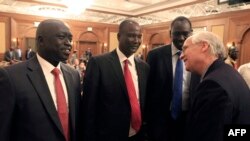JUBA —
U.S. Special Envoy to Sudan and South Sudan Donald Booth called Friday for the rapid deployment of a regional force in South Sudan to protect teams monitoring the country's shaky ceasefire.
“Key to achieving a real cessation of hostilities will be the deployment of monitors,” Booth told journalists in today's telephone news conference.
“There is a monitoring and verification mission established by the Intergovernmental Authority on Development, or IGAD. Those monitors are now in the field in South Sudan. They had been put in the field to operate in a benign environment, but since that did not exist, they were constrained in what they could do,” he said.
Booth’s call for African boots on the ground in South Sudan was the second by a top U.S. official in as many weeks.
Last week, the State Department's assistant secretary for African affairs, Linda Thomas-Greenfield, made a similar call for an African protection force to be deployed in South Sudan.
"We have to work closely with the leaders in the region to make sure that we get IGAD troops on the ground who will be put in position so that they can monitor the agreement and ensure that anyone who is involved in breaking that agreement will be held responsible," Thomas-Greenfield said in a televised question and answer session with callers from around Africa.
The Intergovernmental Authority on Development (IGAD) has been trying since January to broker a peace deal between the warring sides in South Sudan.
A cessation of hostilities agreement signed at the end of January called for monitoring and verification teams made up of civilians and "individuals with a military background" to be deployed around South Sudan.
The first team of monitors are unarmed. The were deployed last month under the terms of the January 23 agreement, but fighting has continued in spite of their presence.
Booth said, however, the fighting has diminished since President Salva Kiir and opposition leader Riek Machar signed a peace agreement two weeks ago.
“What we have seen is, compared to prior to the May 9 agreement, the level of fighting between the two sides has indeed declined,” Booth said.
“Key to achieving a real cessation of hostilities will be the deployment of monitors,” Booth told journalists in today's telephone news conference.
“There is a monitoring and verification mission established by the Intergovernmental Authority on Development, or IGAD. Those monitors are now in the field in South Sudan. They had been put in the field to operate in a benign environment, but since that did not exist, they were constrained in what they could do,” he said.
Booth’s call for African boots on the ground in South Sudan was the second by a top U.S. official in as many weeks.
Last week, the State Department's assistant secretary for African affairs, Linda Thomas-Greenfield, made a similar call for an African protection force to be deployed in South Sudan.
"We have to work closely with the leaders in the region to make sure that we get IGAD troops on the ground who will be put in position so that they can monitor the agreement and ensure that anyone who is involved in breaking that agreement will be held responsible," Thomas-Greenfield said in a televised question and answer session with callers from around Africa.
The Intergovernmental Authority on Development (IGAD) has been trying since January to broker a peace deal between the warring sides in South Sudan.
A cessation of hostilities agreement signed at the end of January called for monitoring and verification teams made up of civilians and "individuals with a military background" to be deployed around South Sudan.
The first team of monitors are unarmed. The were deployed last month under the terms of the January 23 agreement, but fighting has continued in spite of their presence.
Booth said, however, the fighting has diminished since President Salva Kiir and opposition leader Riek Machar signed a peace agreement two weeks ago.
“What we have seen is, compared to prior to the May 9 agreement, the level of fighting between the two sides has indeed declined,” Booth said.






